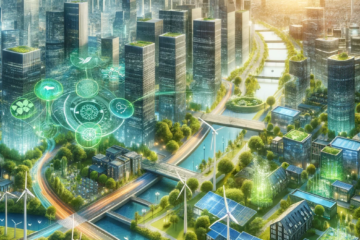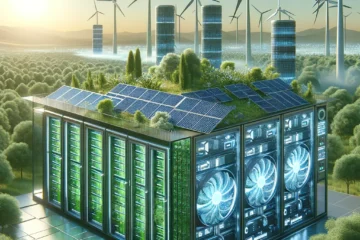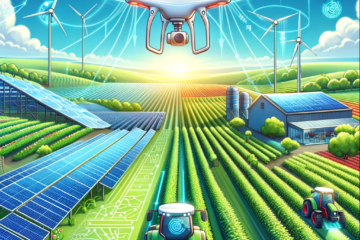Agriculture has always been a cornerstone of human civilization, evolving with the times to meet the ever-growing demands of a burgeoning global population. In the current era, the fusion of technology with traditional farming practices, particularly through the use of drones, has revolutionized the sector. This article delves into the impact of drone technology on precision agriculture, examining how it contributes to sustainability, data analytics, and technological advancements.
Precision Agriculture: A Modern Farming Revolution
Precision agriculture represents a significant shift from conventional farming methods. It’s an approach that utilizes detailed, site-specific information to manage agricultural practices more effectively. Drone technology has emerged as a pivotal tool in this revolution. These aerial devices, equipped with advanced sensors, cameras, and data analytics capabilities, provide farmers with an unprecedented level of insight into their crops and land.
Enhanced Crop Monitoring and Management
Drones, with their bird’s-eye view, offer comprehensive monitoring capabilities. They can survey vast expanses of land quickly and efficiently, capturing high-resolution images that reveal critical information about crop health, soil conditions, and more. This data is invaluable for making informed decisions about irrigation, fertilization, and pest control, leading to optimized crop yields.
Resource Optimization and Cost-Reduction
One of the most significant benefits of drone technology in agriculture is resource optimization. Drones can precisely target areas that need attention, reducing the wastage of water, fertilizers, and pesticides. This not only cuts down the costs for farmers but also minimizes the environmental impact of farming, aligning with sustainability goals.
Predictive Analytics and Decision Making
Data collected by drones can be analyzed to predict future crop growth patterns and potential issues. This predictive analysis aids farmers in proactive decision-making, ensuring timely interventions and reducing the risk of crop failure. It symbolizes a move towards smarter, data-driven agriculture.
Sustainability: Drones Leading the Way to Greener Farming
The integration of drone technology in agriculture aligns seamlessly with sustainability efforts. It promotes environmentally friendly farming practices that are crucial in the face of climate change and resource depletion.
Reducing Environmental Footprint
Drones help reduce the environmental footprint of farming by minimizing the overuse of water, fertilizers, and pesticides. By ensuring these resources are used efficiently and only where needed, drones contribute to preserving the natural ecosystem.
Conservation of Biodiversity
Precision agriculture aids in the conservation of biodiversity. Targeted farming practices ensure that the surrounding flora and fauna are less disrupted, maintaining ecological balance. Drones play a key role in monitoring and maintaining this balance.
Sustainable Crop Management
Drones facilitate sustainable crop management practices. They support crop rotation and soil health monitoring, essential components of sustainable agriculture. This not only enhances crop quality and yield but also ensures the long-term viability of farming land.
Technological Advancements: Drones as Agricultural Innovators
The use of drones in agriculture is a testament to the rapid advancements in technology and its application in enhancing human life.
Innovations in Drone Technology
The continuous evolution of drone technology, with improvements in battery life, sensor quality, and data processing capabilities, has made drones more accessible and effective for farmers. These innovations have transformed drones from a novelty to a necessity in modern agriculture.
Integration with Other Technologies
Drones don’t operate in isolation. They integrate seamlessly with other technological advancements like IoT, AI, and big data analytics. This synergy enhances the overall efficiency and effectiveness of precision agriculture, opening new avenues for innovation and improvement.
Future of Farming Technology
The future of farming technology looks promising, with drones at the forefront. Advancements in autonomous drones, AI-driven analytics, and machine learning algorithms are set to further revolutionize agriculture, making it more efficient, productive, and sustainable.
Data Analytics: Transforming Agricultural Data into Insights
The power of data analytics in precision agriculture, facilitated by drone technology, cannot be overstated. It’s the linchpin that transforms raw data into actionable insights.
Real-time Data Collection and Analysis
Drones collect vast amounts of data in real-time. This data, once processed and analyzed, provides farmers with instant insights into their crops and fields, enabling quick and effective decision-making.
Historical Data and Trend Analysis
Historical data collected over time aids in understanding long-term trends and patterns in agriculture. This information is crucial for strategic planning and can lead to breakthroughs in crop management and yield optimization.
Customized Solutions for Farmers
The analysis of drone-collected data leads to customized solutions for farmers. It allows for a personalized approach to farming, where strategies and interventions are tailored to the specific needs of each farm, enhancing efficiency and productivity.
Conclusion: Drones – A Catalyst for Agricultural Transformation
The impact of drones on precision agriculture is profound and far-reaching. By enhancing sustainability, driving technological advancements, and leveraging data analytics, drones are reshaping the landscape of modern agriculture. They represent not just a tool for farmers but a catalyst for a more efficient, productive, and sustainable future in farming. As we continue to embrace these innovations, the promise of a greener, more prosperous agricultural sector becomes increasingly attainable.




